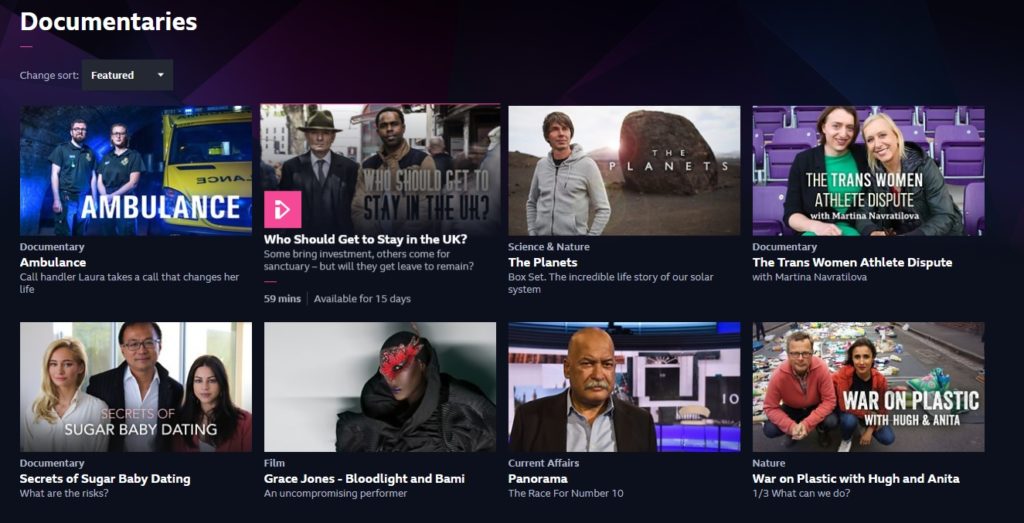Stream BBC Documentaries Online
One of the reasons, I love the BBC iPlayer is the huge variety of programs that you can find there. I know some people just login to catch Eastenders or simply to watch the BBC News each night, but there really is so much more on there. One of my favorite things to watch are the science and nature documentaries of which there are many. The BBC has always ‘done’ science well, they have after all had decades of experience. They’ve certainly come a long way from those late night broadcasts made with the Open University in the 1970’s, where some hippie professor would talk you to sleep.

Here’s a quick selection of some of the documentaries currently showing on the BBC iPlayer. Just did a quick count and there are over 300 different ones listed, many of them full series and box sets! Two of my current favourites are Brian Cox’s – The Planets which will blow you away on any high definition TV set and the Panorama current affairs show. If you’re outside the UK you’ll need a VPN or something called Smart DNS to get access, so here’s one that has a completely free trial if you want to test it – no cards, subscription required.
Completely Free Smart DNS Trial
It’s faster than most VPNs I’ve used with the BBC as you only route enough of the traffic to hide your location. Try it out, it’s easy to set up on most devices too.
Watch All Sorts of BBC Documentaries
Although to see an example you don’t even need to get onto BBC iPlayer as they do post some short snippets in different locations especially their YouTube channel. Here’s a great example of how they explain potentially difficult subjects in a straight forward and entertaining way.
Albert Einstein’s theory of general relativity completely changed the notion of the Universe. It shed light on the birth of the universe, planetary orbits and black holes. It also has very practical uses, like in GPS navigation. But what exactly is this theory and why was it so revolutionary? Until the early 20th Century, physics was mostly explained in terms of Isaac Newton’s laws. For Newton, gravity was a force generated by the mass of an object causing them to attract each other, heavier objects pulling others more intensely. This is why we stand on the ground on Earth, said Newton… it attracts us to its centre. And it’s why planets move around the Sun. But imagine if the Sun disappeared completely. According to Newton’s theory, the planets of the Solar System would instantly abandon their orbits, as there would be no gravity attracting them to the Sun. For Newton, gravity is a force with immediate action regardless of the distance between the bodies. But according to Einstein’s calculations, light was the fastest thing in the Universe. Nothing could travel faster than light, not even gravity. Light takes about eight minutes to cover the nearly 150 million kilometres that separate the Sun from the Earth.
So, if the Sun disappeared, how could the Earth go off its orbit before us Earthlings stopped seeing sunlight? Problems like that suggested to Einstein that gravity could have a different explanation than Newton thought. Between 1905 and 1915, Einstein developed the theory of general relativity. He imagined the three dimensions of space and the dimension of time together as a kind of fabric surrounding us, shaped by the presence of celestial bodies. He called it space-time. Imagine the Sun as a heavy bowling ball placed in the middle of a trampoline. The ball makes the surface of the trampoline dip, right? This curvature is what we feel as gravity. So for Einstein, the Earth and the other planets remain in orbit not because the Sun attracts them but because the Sun is such a massive star that other celestial bodies follow the curve it generates in the space-time fabric. Now gravity is no longer considered a force of attraction between two bodies, as Newton thought. It is an effect of the space-time curvature on bodies. So according to Einstein, what would happen if the Sun disappeared? His theory says this disturbance in space-time would form a gravitational wave that would travel to the planets at exactly the speed of light. That means we would see the Sun go dark at the same time as the Earth changes its orbit.
In other words, what Einstein demonstrated is that until then we had been seeing the Universe in the wrong way. The general relativity theory turned Einstein into a world celebrity. Because of him, science (and our imagination) could fly higher and higher. General relativity not only surprises scientists it fascinates us all. .
Update: 2024
I’ve been asked how you install the application recommended here for accessing the BBC on things like Smart TVs and media streamers. Well unfortunately, as Identity Cloaker needs to install software to make it run then this is quite tricky. Instead I’d advice looking for information on access the BBC using DNS which is a very similar option but doesn’t require any installation – you just need access to the network settings to change the DNS.